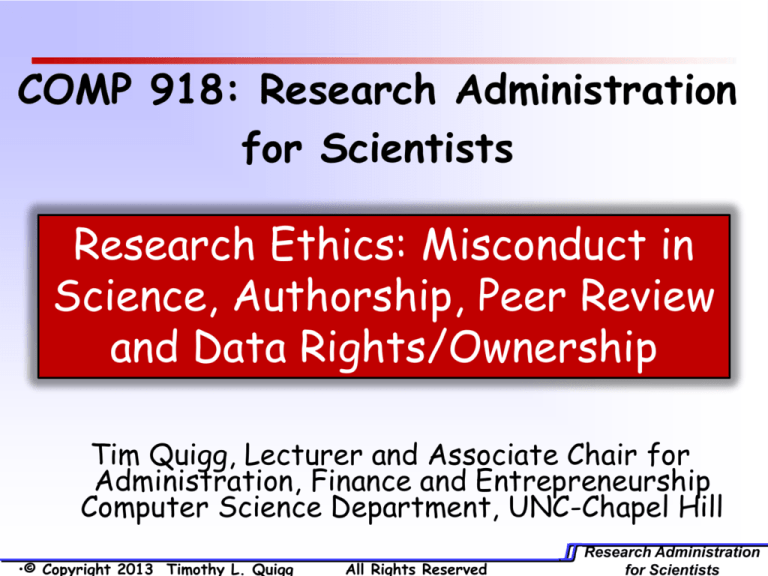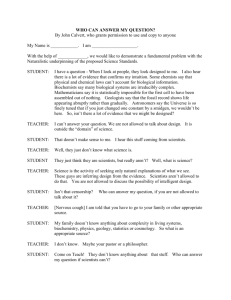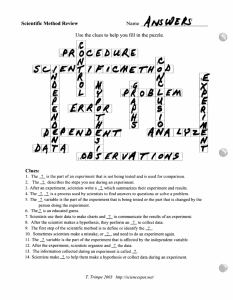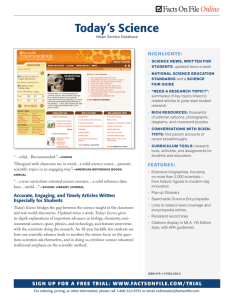
COMP 918: Research Administration
for Scientists
Research Ethics: Misconduct in
Science, Authorship, Peer Review
and Data Rights/Ownership
Tim Quigg, Lecturer and Associate Chair for
Administration, Finance and Entrepreneurship
Computer Science Department, UNC-Chapel Hill
•© Copyright 2013 Timothy L. Quigg
All Rights Reserved
Research Administration
for Scientists
Science is a Community Based on
Trust
“Most Americans see strong science as
essential to a successful future. Yet that
generous social support is based on the
premise that science will be done honestly
and that mistakes will be routinely
identified and corrected.”
Bruce Alberts, President,
National Academy of Sciences,
Research Administration
for Scientists
“The right to search
for truth implies also
a duty;
one must not conceal
any part of what one
has recognized to be
true.”
- Albert Einstein
Research Administration
for Scientists
“The only ethical principle
which has made science
possible is that the truth
shall be told all the time…”
C.P. Snow “The Search” 1959
Quoted in “Honor in Science”
Research Administration
for Scientists
Three Important Themes in
Science
Trust
Truth
Ethics
telling
Trust is
dependent upon
truth-telling!
Research Administration
for Scientists
Three Important Themes in
Science
Trust
Truth
Ethics
telling
If society no longer
believes scientists
are telling the
truth, trust (and
support) for
science will be lost!
Research Administration
for Scientists
Three Important Themes in
Science
Trust
Truth
Ethics
telling
We rely upon
“ethics” to keep
scientists trust
worthy!
Research Administration
for Scientists
Three Important Themes in
Science
Trust
Truth
Ethics
telling
But what exactly
does the term
“ethics” mean?
Research Administration
for Scientists
Three Inter-Related
Aspects of Ethics
A set of principles of right conduct.
The formal rules and standards that
govern the conduct of an individual or
the members of a profession.
Behavior expected of all faculty,
students, and staff to conduct research
with the highest standards of integrity!
Principles – Rules - Behavior
Research Administration
for Scientists
Scientific Fraud and Misconduct
Frequency Over the Past 10 Years
Research Administration
for Scientists
Institutional Compliance
This concern for fraud along with the
conflicts of interest posed by the
commercial opportunities for patenting
and licensing university inventions have
made it necessary for universities to
develop comprehensive systems to
monitor and manage ethics at the
individual and the institutional level!
Research Administration
for Scientists
Four Areas of Concentration for
Institutional Compliance Systems
Proper fiscal management of public funds.
Protection of human and animal research
subjects.
Proper use and disposal of hazardous
materials.
Preventing research misconduct through
strict adherence to the scientific method
and truth telling.
Research Administration
for Scientists
Federal Definition
Research Misconduct
Fabrication, falsification, or plagiarism in
proposing, performing, or reviewing
research or in reporting research results is
research misconduct. It does not include
honest error or differences of opinion.
Research Administration
for Scientists
Federal Definition
Research Misconduct
Fabrication: Making up data or results and
either recording or reporting them.
Research Administration
for Scientists
Federal Definition
Research Misconduct
Falsification: Manipulating research
materials, equipment, or processes, or
changing or omitting data or results such
that the research is not accurately
represented in the research record.
Research Administration
for Scientists
Federal Definition
Research Misconduct
Plagiarism: The appropriation of another
person’s ideas, processes, results, or
words without giving appropriate credit.
Research Administration
for Scientists
Federal Definition
Research Misconduct
Fabrication, falsification, or plagiarism in
proposing, performing, or reviewing
research or in reporting research results is
research misconduct. It does not include
honest error or differences of opinion.
Research Administration
for Scientists
Federal Definition
Research Misconduct
Fabrication, falsification, or plagiarism in
proposing, performing, or reviewing
research or in reporting research results is
research misconduct. It does not include
honest error or differences of opinion.
Use in Any Research
Proposal!
Research Administration
for Scientists
Federal Definition
Research Misconduct
Fabrication, falsification, or plagiarism in
proposing, performing, or reviewing
research or in reporting research results is
research misconduct. It does not include
honest error or differences of opinion.
Use in the Conduct of
Research!
Research Administration
for Scientists
Federal Definition
Research Misconduct
Fabrication, falsification, or plagiarism in
proposing, performing, or reviewing
research or in reporting research results is
research misconduct. It does not include
honest error or differences of opinion.
Use in Formal Peer Review or Any
Other Review of Research Results!
Research Administration
for Scientists
Federal Definition
Research Misconduct
Fabrication, falsification, or plagiarism in
proposing, performing, or reviewing
research or in reporting research results is
research misconduct. It does not include
honest error or differences of opinion.
Use in Project Reports or
Any Publications!
Research Administration
for Scientists
Fabrication, Falsification of
Medical Research Data
By Gary Schwitzer, January 25, 2012
The British Medical Journal reports:
“More than one in ten (13%) UK-based scientists or doctors have
witnessed colleagues intentionally altering or fabricating data during
their research or for the purposes of publication, while 6% say they are
aware of possible research misconduct at their institution that has not
been properly investigated, reveals a BMJ survey published today which
attracted over 2,700 responses.
Dr Fiona Godlee, BMJ Editor in Chief, said: “While our survey can’t
provide a true estimate of how much research misconduct there is in the
UK, it does show that there is a substantial number of cases and that UK
institutions are failing to investigate adequately, if at all. The BMJ has
been told of junior academics being advised to keep concerns to
themselves to protect their careers, being bullied into not publishing
their findings, or having their contracts terminated when they spoke out.”
Disgraced Cloning Expert Convicted in
South Korea
October 26, 2009
SEOUL, South Korea – Hwang Woo-suk, a disgraced cloning
expert from South Korea who had claimed major
breakthroughs in stem-cell research, was convicted Monday
of falsifying his papers and embezzling government research
funds. A judge sentenced him to a suspended two-year
prison term, saying Dr. Hwang had shown remorse and had
not taken research money for personal use.
Dr. Hwang was once hailed as a national hero in the South.
His school, Seoul National University, disowned him in 2005,
saying that he had fabricated the papers he had published
to global acclaim.
Former Harvard professor Marc Hauser
fabricated, manipulated data
September 5, 2012
Marc Hauser, a prolific scientist and popular psychology professor
who last summer resigned from Harvard University, had fabricated
data, manipulated results in multiple experiments, and described
how studies were conducted in factually incorrect ways, according
to the findings of a federal research oversight agency posted online
Wednesday.
The report provides the greatest insight yet into the problems that
triggered a three-year internal university investigation that
concluded in 2010 that Hauser, a star professor and public
intellectual, had committed eight instances of scientific misconduct.
The document, which will be published in the Federal Register
Thursday, found six cases in which Hauser engaged in research
misconduct in work supported by the National Institutes of Health.
One paper was retracted and two were corrected, and other
problems were found in unpublished work.
Cases of Plagiarism Handled by the United States
Office of Research Integrity 1992-2005
By Alan R. Price, Associate Director for Investigative Oversight
Office of Research Integrity
ORI Definition of Plagiarism : As a general working definition, ORI
considers plagiarism to include both the theft or misappropriation of
intellectual property and the substantial unattributed textual copying of
another's work. It does not include authorship or credit disputes. . . .
Many allegations of plagiarism involve disputes among former
collaborators who participated jointly in the development or conduct of a
research project, but who subsequently went their separate ways and
made independent use of the jointly developed concepts, methods,
descriptive language, or other product of the joint effort. The ownership
of the intellectual property in many such situations is seldom clear, and
the collaborative history among the scientists often supports a
presumption of implied consent to use the products of the collaboration
by any of the former collaborators. For this reason, ORI considers many
such disputes to be authorship or credit disputes rather than plagiarism.
Such disputes are referred to PHS agencies and extramural institutions
for resolution (ORI, 1994).
Cases of Plagiarism Handled by the United States
Office of Research Integrity 1992-2005
By Alan R. Price, Associate Director for Investigative Oversight
Office of Research Integrity
Kowalski - He was an instructor in medicine at the Dana
Farber Cancer Institute, after completing his residency and
postdoctoral work in pathology at Harvard Medical School. He
took with him an NIH grant application on the immune
response to HIV/AIDS glycoprotein by his mentor, focusing
on an area in which the respondent had not worked nor
written for that laboratory (thus, he was not a collaborator
on the source application). He copied essentially the whole
application of his former mentor for use as his own NIH
grant application, as alleged by a reviewer who had seen the
original application at NIH. He was not debarred, but in 1993
he was given a 3-year certification and prohibition from PHS
service period.
Cases of Plagiarism Handled by the United States
Office of Research Integrity 1992-2005
By Alan R. Price, Associate Director for Investigative Oversight
Office of Research Integrity
Imam - He was an associate professor of pathology at the
University of Southern California who copied almost all of a
grant application on human DNA telomerase enzyme to a
state agency, which had been given to him in confidence by a
peer reviewer. The respondent used it in his own NIH grant
application, as alleged by a reviewer, who was the original
applicant. In 1997, he was debarred for 3 years as well as
prohibited from PHS advisory service.
Cases of Plagiarism Handled by the United States
Office of Research Integrity 1992-2005
By Alan R. Price, Associate Director for Investigative Oversight
Office of Research Integrity
Farooqui - He was a research associate professor of
dermatology at the University of Cincinnati, who plagiarized
material on hormone expression in human skin from the
significance section of a National Science Foundation (NSF)
grant application, as alleged by a reviewer for NSF, which the
respondent had obtained from another confidential reviewer
and used in his NIH grant application. After ORI imposed on
him in 1996 a 3-year certification and non-service period,
NSF OIG expanded the case, finding more of the same
plagiarism in NSF applications, so NSF debarred him for an
additional period.
Institutional
Responsibility
Awardee institutions have primary
responsibility for the prevention and
detection of research misconduct and
for the inquiry and investigation of
alleged research misconduct.
Research Administration
for Scientists
Laboratory Notebook!
Yes, the laboratory notebook (real or virtual) is
still the “gold standard” and final authority on
data collection, manipulation, and presentation.
It should contain:
All the information on an experiment’s design
and execution.
The original data - preferably as the raw data
output.
Calculations and data reductions.
Conclusions and interpretations.
Courts have favored paper over electronic!
Research Administration
for Scientists
Laboratory Notebook!
Yes, the laboratory notebook (real or virtual) is
still the “gold standard” and final authority on
data collection, manipulation, and presentation.
It should contain:
All the information on an experiment’s design
and execution.
The original data - preferably as the raw data
output.
Calculations and data reductions.
Conclusions and interpretations.
Should be signed, dated and witnessed!
Research Administration
for Scientists
Who Owns Data?
PI, Institution or Funding Agency?
It Depends!
If created under a sponsored research
agreement, the terms (FAR clauses) are
authoritative.
Remember, all agreements are between the
university and the funding agency in the
name of a PI, so any obligation to deliver
data rest with the university.
What is the university’s data rights policy?
Research Administration
for Scientists
Case Study: Data Ownership
A graduate student has just defended
her dissertation and is leaving for a post
doctoral position at another university.
While packing up her office, her mentor
refuses to allow her to take the
laboratory notebooks which contain her
research data.
The mentor won’t even allow her to take
copies.
Research Administration
for Scientists
Who do you think owns the research
data?
Should the student have been allowed to
take the results of her labors? How
about a copy?
Would your view be different if the
student was going to a competitor’s
laboratory? How about into industry?
Research Administration
for Scientists
Federal Definition
Research Misconduct
Fabrication: Making up data or results and
recording or reporting them.
Research Administration
for Scientists
Case Study: Data Fabrication
You believe the work of a fellow student
assigned to your lab is forged. The data
are too clean, the student isn’t in the lab
often enough to support the amount of
data generated, and sufficient reagents
are not being consumed consistent with
the research.
Research Administration
for Scientists
Is there enough “evidence” to allege data
fabrication?
Let’s say you report your suspicions to
the PI and are simply told to “mind your
own business” - What would you do?
Is reporting your concern to the PI
sufficient? Do you have additional
ethical responsibilities? When have you
adequately fulfilled your ethical
responsibilities?
Research Administration
for Scientists
Federal Definition
Research Misconduct
Falsification: Manipulating research
materials, equipment, or processes, or
changing or omitting data or results such
that the research is not accurately
represented in the research record.
Research Administration
for Scientists
Case Study: Data Falsification - 1
You are a junior member of a research
team using an autoanalyzer to test the
effects of radioprotective agents on
prostaglandin production. Only six of the
ten assays demonstrate protection.
A senior researcher (not the PI) suggests
the lack of observed response in the other
four assays was due to “equipment failure.”
Research Administration
for Scientists
Is this assessment valid? Should it be
accepted, rejected or questioned?
How might the assessment be tested?
If the ambiguity persists, how should you
proceed?
Is leaving responsibility with the senior
investigator enough? Would it matter if
the PI agreed with the senior investigator?
Research Administration
for Scientists
Case Study: Data Falsification - 2
You prepare a scatter-graph that
demonstrates a time-dependent effect.
Unfortunately, several points do not
closely follow the relationship.
Your advisor suggests dropping the
lowest points because “the cells were
obviously dead” and the highest point
because “it is an obvious outlier.”
Research Administration
for Scientists
Is the suggested method for determining
which points to exclude acceptable?
If you are not satisfied with the
instructions from your advisor, what
other course(s) of action are open to you
in this situation?
In general, how would you approach your
advisor when facing any issue involving
proper ethical behavior?
Research Administration
for Scientists
Federal Definition
Research Misconduct
Plagiarism: The appropriation of another
person’s ideas, processes, results, or
words without giving appropriate credit.
Research Administration
for Scientists
Case Study: Plagiarism
You are reviewing a paper for a journal and
recognize a significant portion of the text.
After checking, you confirm that the paper
indeed incorporates entire passages from
other works without attribution.
What Action Should You
Take?
Research Administration
for Scientists
Immediately report your concerns to the
Journal? Or would you contact the author
first? Would knowing the author influence
your actions?
If you spoke with the author would any of
these explanations cause you to be more
lenient:
• The author said it was simply a careless oversight.
• The author is a first year graduate student with
little experience.
• The author comes from a country with different
standards for citations.
Research Administration
for Scientists
Authorship
Authorship of a scientific paper should
be limited to those individuals who have
contributed directly to:
the design and execution of the
experiments and
Is “and”
participated in the preparation
right or
of the manuscript.
should it
say
There may be some variation
“and/or?”
by discipline!
Research Administration
for Scientists
Case Study: Authorship
A paper is being prepared concerning the
metabolism of sulfites. Which of the
following should be included as authors?
– Toxicologist who provided previously
published information on animal models.
– Wildlife specialist who provided information
on breeding mice.
– Technician who helped develop assay and
wrote the methods section.
– Another scientist who helped design
experiments and edited the final draft.
Research Administration
for Scientists
Peer review is the process used within
the scientific community where
scientists evaluate their colleagues’
grant applicants for possible funding
and their scientific papers for possible
publication.
Two guiding principles:
Fairness
Confidentiality
Research Administration
for Scientists
Case Study: Peer Review
A faculty investigator who is also a
consultant to a biotech company serves
on an NIH study section. He reviews a
grant proposal which contains
information demonstrating that his
current work (both academic and
corporate) is headed down a blind alley.
How Should He Proceed?
Research Administration
for Scientists
Case Study: Peer Review
What issues of confidentiality and
conflict of interest are involved?
“Once the bell has been rung, it can’t be
unrung!” Now that he has the knowledge,
he can’t just forget it!
How might this situation have been
avoided?
Research Administration
for Scientists
False Claims Act
Whistleblowers
A good faith allegation is made with
the honest belief that research
misconduct may have occurred. An
allegation is not in good faith if it is
made with reckless disregard for or
willful ignorance of facts that would
disprove the allegation.
Research Administration
for Scientists
False Claims Act
Qui Tam Provisions
“He who sues on behalf of the King as well
as for himself.”
Allows private parties to sue entities and
individuals that have submitted false
claims to the Government.
The person must have actual knowledge of
allegedly false claims to the Government to
file a lawsuit on behalf of the Government.
Research Administration
for Scientists
False Claims Act
Qui Tam Provisions
■
■
If the Government receives a monetary
settlement from the defendant, the Act
allows the person bringing the suit to
receive a portion of the settlement.
Individuals seeking whistleblower status
must first meet several criteria defined in
the Act.
Check to be certain you qualify for
whistleblowers status before proceeding!
Research Administration
for Scientists
False Claims Act
Qui Tam Provisions
■
■
If the Government receives a monetary
settlement from the defendant, the Act
allows the person bringing the suit to
receive a portion of the settlement.
Individuals seeking whistleblower status
must first meet several criteria defined in
the Act.
Whistleblowers status affords some legal
protection against retaliation!
Research Administration
for Scientists
False Claims Act Recovery
■
■
■
In 2008, the Government recovered
approximately $1.3 billion through False
Claims Act suits.
90% of the recovered funds came from
health care and pharmaceutical companies.
For 2009, Congress allocated an additional
$25 million to combat fraud and abuse in
the Medicaid Program alone.
Research Administration
for Scientists
False Claims Act
University of Georgia
This 2006 suit alleged that University of
Georgia researchers committed violations
of the False Claims Act by receiving more
than $1 million in Environmental Protection
Agency grants based upon published
research that had used manipulated data
which discounted the toxicity of the tested
sewage sludge.
Research Administration
for Scientists
False Claims Act
University of Georgia
The suit was filed by the Government on
behalf of qui tam (whistle-blower) plaintiffs
David L. Lewis, an adjunct senior research
scientist at UGA (and a former
microbiologist at the Environmental
Protection Agency), and two farming
families who alleged the sludge contained
harmful chemicals that resulted in the
death of cattle on their farms.
Research Administration
for Scientists
False Claims Act
University of Georgia
The suit specifically alleged that sludge
samples were:
not included from farms that reported
animal deaths and
were taken only during drought periods
when toxin levels would be lowest.
Results of litigation sealed!
Research Administration
for Scientists
False Claims Act
St. Louis University
This suit was brought by whistleblower and
former Dean, Andrew Balas. It alleged the
SLU School of Public Health overstated
time spent by faculty members on CDC
grants, resulting in significant overpayment.
The investigation identified numerous
examples of NIH and HUD grants being
charged for these “phantom faculty work
hours” resulting in similar overpayments.
Research Administration
for Scientists
False Claims Act
St. Louis University
SLU’s Defense: A good faith effort had
been made to comply with “highly
complicated cost accounting principles
governed by regulations that are hundreds
of pages long.” Any mistakes made were
simply that – unintentional mistakes!
This is the “don’t blame me” defense! It’s
the Government’s fault for making the
rules so darn hard to follow!
Research Administration
for Scientists
False Claims Act
St. Louis University
SLU’s Defense: A good faith effort had
been made to comply with “highly
complicated cost accounting principles
governed by regulations that are hundreds
of pages long.” Any mistakes made were
simply that – unintentional mistakes!
SLU settled for $1 million.
The whistleblower received $190,000 as his
share of the recovery! Research Administration
for Scientists
False Claims Act
Weill Medical College,
Cornell
The whistleblower was:
The PI’s senior administrative assistant.
She had worked at Cornell for 11 years
before resigning 2002.
She filed the suit in April 2004.
Research Administration
for Scientists
False Claims Act
Weill Medical College,
Cornell
The lawsuit alleged that the PI
misrepresented which researchers were
working on particular grants; misapplied
and fraudulently accounted for grant
funds; falsified data from research; and
submitted the same projects multiple
times even if funded by other agencies.
Research Administration
for Scientists
False Claims Act
Weill Medical College,
Cornell
The lawsuit alleged that the PI
misrepresented which researchers were
working on particular grants; misapplied
and fraudulently accounted for grant
funds; falsified data from research; and
submitted the same projects multiple
times even if funded by other agencies.
Research Administration
for Scientists
False Claims Act
Weill Medical College,
Cornell
The lawsuit alleged that the PI
misrepresented which researchers were
working on particular grants; misapplied
and fraudulently accounted for grant
funds; falsified data from research; and
submitted the same projects multiple
times even if funded by other agencies.
Research Administration
for Scientists
False Claims Act
Weill Medical College,
Cornell
The lawsuit alleged that the PI
misrepresented which researchers were
working on particular grants; misapplied
and fraudulently accounted for grant
funds; falsified data from research; and
submitted the same projects multiple
times even if funded by other agencies.
$2.6 million settlement!
Research Administration
for Scientists
False Claims Act
Yale University
Yale researchers allegedly spent down
remaining grant funds near the expiration
dates via cost transfers that were deemed
not “allocable”, i.e., the costs did not relate
to the work of that specific project.
Note: Federal regulations require that
unspent fund balances at the end of a grant
be returned to the Government.
Research Administration
for Scientists
False Claims Act
Yale University
■
■
■
■
$7.6 million final settlement - $3.8 million
actual plus $3.8 million punitive damages.
No criminal charges were brought.
The Government acknowledged Yale’s
cooperation in the investigation and its
ongoing efforts at reform.
It is likely that Yale’s consulting & legal
fees exceeded the final settlement amount.
Research Administration
for Scientists
False Claims Act Suits
Involving Falsified Effort
Reporting
Many False Claims Act suits allege that:
•
•
Researchers spent less time working on
grants than the proposal promised or
The grant was charged for someone who
didn’t work on the grant.
Resulting in overstatement of effort!
Research Administration
for Scientists
False Claims Act
Selected University
Settlements
Northwestern- $5.5m (Feb, 2003)
Johns Hopkins - $2.6m (Feb, 2004)
Alabama-Birmingham - $3.4m (Apr, 2005)
Cornell- $4.4m (Jun, 2005)
University of Connecticut- $2.5m (Jan,
2006)
Harvard- $2.4m (June 2004)
Research Administration
for Scientists
Effort Reporting
Case Study
■
■
■
■
■
■
Physician Scientist Dr. E. Coli
Any cause
for concern
2 NIH grants - 25% effort
with Dr.
3 days/week in clinic
Coli’s
Directs Infectious Diseases
effort?
medical curriculum
Lectures to medical students three times
per week, and
Serves on the institutional promotion and
tenure committee.
Research Administration
for Scientists
Federal Investigative
Agencies for NIH and NSF
Office of Research Integrity in the DHHS,
promotes integrity in biomedical and
behavioral research supported by PHS. ORI
monitors institutional investigations of
research misconduct (www.ori.hhs.gov)
Office of the Inspector General in the NSF
is responsible for preventing, detecting, and
handling cases involving research misconduct
(www.nsf.gov/oig)
Research Administration
for Scientists







